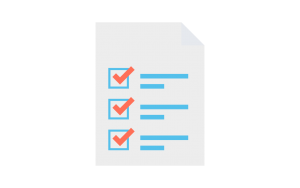Within the CRAFTS 3.0 project, content development is ongoing across all partners. As INQS is developing content around Competence Unit 4 – “Monitoring supporting and evaluating the learning process”, we thought that we would share some of the developed content which is aimed at supporting handicraft teachers:
Online questionnaires are, quite simply, questionnaires that are conducted online rather than via the more traditional paper-based approach and which can be accessed by respondents via a weblink. Respondents answer the questionnaires online and the data is gathered into a database of sorts by the online questionnaire tool.
The primary advantage of online questionnaires is that they can be widely and easily distributed amongst a large number of people. This can facilitate a move away from the requirement to fill in paper-based questionnaires, which can be time consuming to gather on a one-to-one basis. Most online questionnaire tools also typically automatically perform basic analysis on the quantitative data gathered and generally allow you to export all results to a digital format (e.g. an excel spreadsheet). This avoids considerable additional effort typically required in analysing data from face-to-face or paper-based questionnaires. From the point of view of the individual answering the online questionnaire, the feeling of having a voice (by giving feedback) can be a motivating experience and the possibility to easily access an online questionnaire at home, or in transit on their laptop or mobile device can be very helpful.
A recommended tool for the development of online questionnaires is Google Forms. Google forms is free to use – requiring only a google account – and provides the ability to create a questionnaire featuring a wide range of questions, the ability to edit the look and feel of the questionnaire, initial basic analysis of responses and the ability to download or display the results in a spreadsheet.
Some examples of the different ways in which you can use online questionnaires for gathering feedback from apprentices can include:
- Gauging the apprentice’s overall satisfaction with the apprenticeship
learning process and the teaching involved.- Allowing apprentices to indicate what elements of the training they are
unfamiliar with or what elements they need revisited.- Allowing apprentices to indicate pre-existing attitudes, knowledge,
biases, etc. at the beginning of a learning experience and then comparing
these to same at the end of a module- Etc.
For more on the Crafts 3.0 project (including the developed European ECVET Curriculum on Management of Apprenticeship Programs for Handicraft Teachers), please see http://crafts-project.eu/
